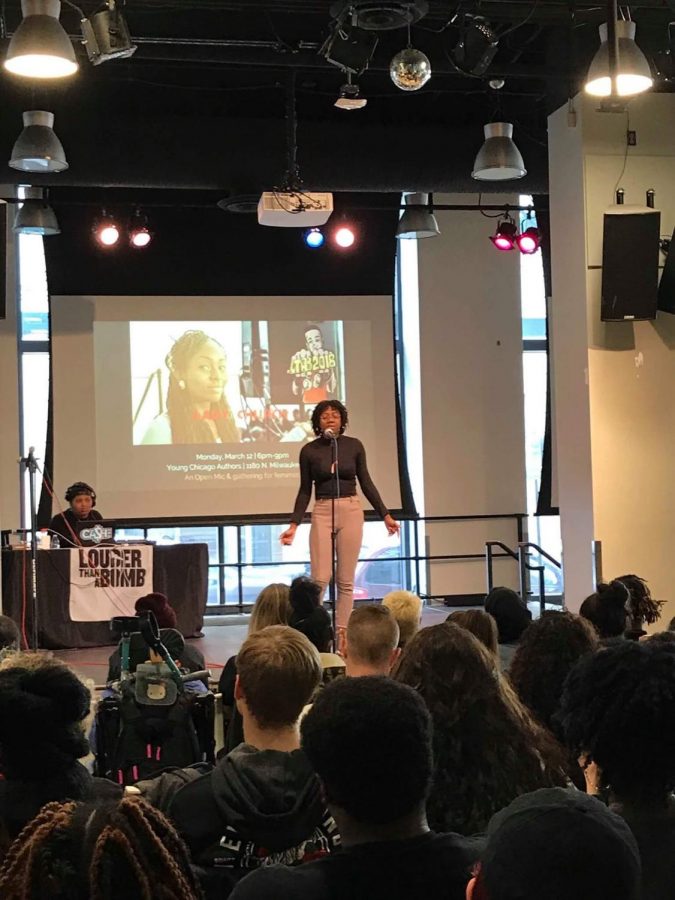Poems with a purpose at annual Louder Than a Bomb slam festival
Poetry club takes on societal issues with an artistic flair
“The point is not the points, the point is the poetry.” This attitude is what permeates the annual Chicago-area high-school poetry slam Louder Than a Bomb.
This year, many performers chose to use their literary talents to tackle larger societal issues in their poems.
Common topics included the #MeToo movement, gun violence, LGBTQ issues, undocumented immigrants, and equality in general.
“One of the great things about Louder Than a Bomb is that it is a good barometer of what larger issues society is facing,” said sponsor and English teacher John O’Connor.
New Trier Poetry Club won the second preliminary bout this year, but did not advance into the Sweet 16. While the team did go further in the competition than in previous years, club members focused on how the experience of sharing their poetry was the most rewarding aspect.
Junior co-head Lila Formicola, who has performed at Louder Than a Bomb for two years, said, “It enables me to share my feelings in an open environment where I feel safe and supported.”
Senior Alexia Raucci performed an individual piece about the power that love and compassion can have on equality.
“My goal is to always write my truth and to make sure it’s heard,” Raucci said.
“Often times, students and young people can feel as if their voices are being overlooked. Poetry can be an outlet for expressing these ideas,” said senior José Chavez. “We start forming very strong opinions and point of views that go unnoticed, so we put it all in poetry.”
Compared to previous years, more poems had an underlying seriousness that was not present before, noted O’Connor.
“While there always are some jokey and just-for-fun poems, the number of them seems to have decreased this year,” he said.
Chavez felt that the majority of the poems performed at LTAB were inspired by a current event or injustice.
This year the group poem, performed by four Poetry Club members, focused on the negative effects of romanticizing mental illnesses. The poem emphasized the importance of recognizing and taking mental illness seriously.
Louder Than a Bomb hosted over 1,200 poets this year as well as more than 3,000 audience members at the 90 different events held. These included the classic poetry slams, open mic nights, and musical performances.
New Trier has been competing in Louder Than a Bomb since 2008 when O’Connor’s daughter, Allison, discovered the event and got Poetry Club involved.
The first time Poetry Club went to the event they only had three poets. This year, nine members performed out of the fifteen total in the club. The four-team round final competition was held on Mar. 18 at Roosevelt University.
Slam poetry has developed over the past few years, and has been parodied in movies such as 22 Jump Street. The satires portray slam poetry as many choppy sentence fragments, and lots of yelling. While this is an exaggeration, O’Connor noted how real slam poetry does often fit in with these preconceptions.
“I would like to see people move away from that set form, rebel against that form in the future,” he said.Many of the performances this year, because of their focus on serious social issues, were more personal and somber.
“Especially considering the climate were in, the art that is performed truly captures the spirit of Louder Than a Bomb and the intensity of the artists,” Formicola added.
Poetry has become a way for teens especially to discuss important topics that may not be suited to everyday small talk, as is evident in Louder Than a Bomb this year. By being such a creative art form, poets can express their thoughts on controversial matters, adding in personal elements and raising thought-provoking questions.
“When it comes to writing and performing poetry, my number one goal is to leave the audience with a metaphorical seed–an idea,” Chavez said. “The audience can take that seed and nurture it, watch it grow, and share what they have made with someone else.”







































